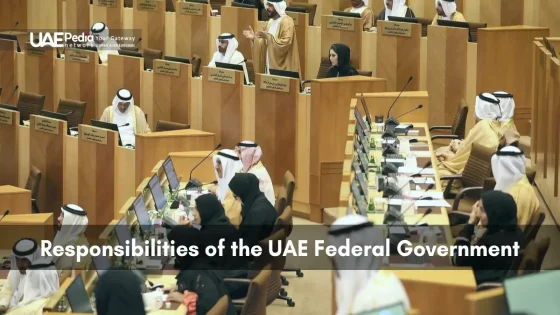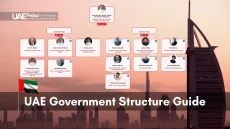UAE Federal Decrees are key to the UAE’s Governance. They shape the country’s political structure. For example, Federal Law by Decree No. (49) of 2022 has 49 articles on human resources.
This shows the UAE’s dedication to good governance. But did you know? Breaking labor laws can cost up to AED 1,000,000.
UAE Federal Decrees and Their Constitutional Foundation
The UAE Constitution is the heart of the country’s laws. It explains how federal laws are made and who has the power to make them. Article 110 is key in building the country’s government.

Legal Framework Under Article 110
Article 110 tells us how federal laws are made. It shows the roles of important government groups. The Cabinet, Federal National Council, President, and Supreme Council all help make laws.
Federal Government’s Legislative Authority
The federal government has a lot of power to make laws. It deals with big things like foreign affairs, defense, and money. It also looks after education and health. This helps keep the seven emirates the same.
Jurisdictional Scope of Federal Laws
Federal laws in the UAE cover a lot. They handle work, social services, and laws for good and bad actions. They also protect ideas and creations. This helps keep the country together.
| Area of Jurisdiction | Governing Body |
|---|---|
| Foreign Affairs | Federal Government |
| Defense and Security | Federal Government |
| Federal Finance | Federal Government |
| Education | Federal Government |
| Public Health | Federal Government |
| Local Matters | Emirate Governments |
The UAE’s laws balance federal and local power. The federal government has a lot of power, but local governments have some too. This way, the country is well-run and each emirate is respected.
UAE Federal Decrees: Process and Implementation
The UAE’s federal decree system is complex. It involves many governing bodies. This ensures laws are made fairly and well.
Role of the Federal National Council
The Federal National Council (FNC) is key in making laws. The Cabinet sends bills to the FNC for check. The FNC can pass, change, or reject these bills.
Presidential Approval and Supreme Council Ratification
After the FNC reviews, bills need the President’s okay. Then, the President sends them to the Supreme Council for approval. This step helps keep the system balanced.
Timeline and Enforcement Mechanisms
Laws start one month after they’re published in the Gazette. This gives everyone time to understand the new rules before they’re enforced.
Emergency Decree Powers
In emergencies, the President and Cabinet can make decree laws. These laws are for quick action. They must be checked by the Council within a week.
| Decree Type | Approval Process | Implementation Timeline |
|---|---|---|
| Regular Federal Decree | FNC Review, Presidential Approval, Supreme Council Ratification | One month after Gazette publication |
| Emergency Decree | Presidential and Cabinet Approval, Supreme Council Review within a week | Immediate, subject to Council approval |
Recent Significant Federal Decrees and Their Impact
The UAE has made big changes to fight climate change and improve rules. In 2024, a new law was passed to help the UAE use less energy and clean up waste. It also created a National Carbon Credit Registry to track carbon emissions.
This law sets targets to reduce emissions every year. It makes sure everyone in the UAE, including free zones, tracks their emissions. They must keep records for five years.
In 2024, the UAE also updated its money laundering laws. This change made the UAE’s financial system stronger. It helped the UAE get off a list of countries watched for money issues.
These changes affect more than just the environment and money. A new law fines employers who break labor rules. Fines can be as much as AED1 million. It also makes it easier to solve work disputes, helping the UAE be a better place to work.


















